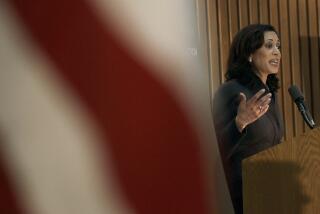Crime Summit Didn’t Leave Lasting Mark
- Share via
SACRAMENTO — Unlike Lincoln’s Gettysburg Address or even Speaker Willie Brown’s economic summit, Gov. Pete Wilson’s convocation on crime probably will not long be remembered.
Not that the two-day event this week at the Hollywood Presbyterian Church wasn’t a good thing to do. It clearly was, both in terms of public policy debate and Wilson politically.
It was a carefully orchestrated campaign extravaganza that undoubtedly gave the Republican governor a slight boost in his uphill race for reelection. The fact it was staged as Treasurer Kathleen Brown was embarking on a statewide tour to officially launch her gubernatorial bid was not a mere coincidence. Wilson was able to showcase his “tough on crime” positions while subliminally inviting the public to compare them with Brown’s, which the governor will try to characterize as squishy soft.
Underscoring Wilson’s political reliance on the crime issue, a GOP spokesman went to Brown’s kickoff in Burbank and distributed to reporters a flyer with side-by-side mug shots of the Democratic front-runner and former California Chief Justice Rose Elizabeth Bird, whose death penalty rulings prompted her ouster by voters.
So one does not need to be a cynic--only a realist--to see that Wilson’s “summit” was motivated primarily by politics.
That said, so what? Good politics often leads to good policy, or at least policy demanded by the public. And whether opposing conservative and liberal factions in the Legislature now can reach a consensus among themselves and the governor on anti-crime bills will be the test of whether Wilson’s big photo op also was a policy success.
*
Speaker Brown set the standard a year ago with his economic summit in Los Angeles. Most of the Capitol and the corporate community were skeptical. The concept of this “tax and spend” liberal helping to improve the business climate seemed to defy logic. But Brown committed himself to doing just that. And, largely because of his leadership, the Legislature and the governor compromised on a heralded package of economic stimulus bills.
But there are different dynamics at play now. For Sacramento, Brown aligning himself with business was like redbaiter Richard Nixon going to Communist China. Wilson trying to lock up “thugs” is nothing new. Any dramatic impact is short-lived.
Also, the political momentum for getting tougher with criminals has been building for months, largely because of the Polly Klaas murder, the popular “three strikes” initiative and gang violence. Politicians have been reading the polls. The demands are there--throw away the keys and don’t coddle the criminals. The lawmakers really don’t need a new prod from Wilson’s summit.
And unlike the economic summit, where CEOs and economists offered an assortment of ideas that educated legislators, many lawmakers in Hollywood said they heard little new from the array of prosecutors, victims’ rights advocates, cops and community activists. More importantly, they seemed as uncompromising in their views when they left as when they arrived.
“It makes it hard to compromise on a hard-line position when you know you’re right and see things starting to move (your way),” said Assembly GOP Caucus Chairman Curt Pringle of Garden Grove.
*
One elected official seeking compromise and being rebuffed was Atty. Gen. Dan Lungren. The Republican told how he had been in a San Francisco high-rise last summer and left just before a madman with 50-round magazines began gunning down eight people, including two of his luncheon companions.
“I, for the life of me, can’t understand why you need to have 50-round clips,” Lungren said. Turning to Peter Kasler, a Sonoma lawyer and noted opponent of gun controls, the attorney general asked: “Isn’t there something we can do to reach an accommodation?”
Kasler responded that if others in the high-rise had been armed, they might have taken out the assailant. Lungren countered that the mass murderer on the New York subway last December finally was subdued by unarmed passengers when he stopped firing to reload his 15-round weapon. Kasler answered, “Criminals don’t pay any attention to such laws.”
Lungren gave up. And that exchange symbolized much of the summit.
Still, Wilson, Lungren, Speaker Brown and the roughly 50 legislators who attended were forced to hear opposing views from people they might ordinarily ignore. They listened to the firsthand horror stories of victims. The political atmosphere was non-threatening because nobody was counting votes. And the summit was held outside the Capitol, somewhere closer to the real world.
And for all that it was beneficial, if probably not memorable.
More to Read
Get the L.A. Times Politics newsletter
Deeply reported insights into legislation, politics and policy from Sacramento, Washington and beyond. In your inbox twice per week.
You may occasionally receive promotional content from the Los Angeles Times.











